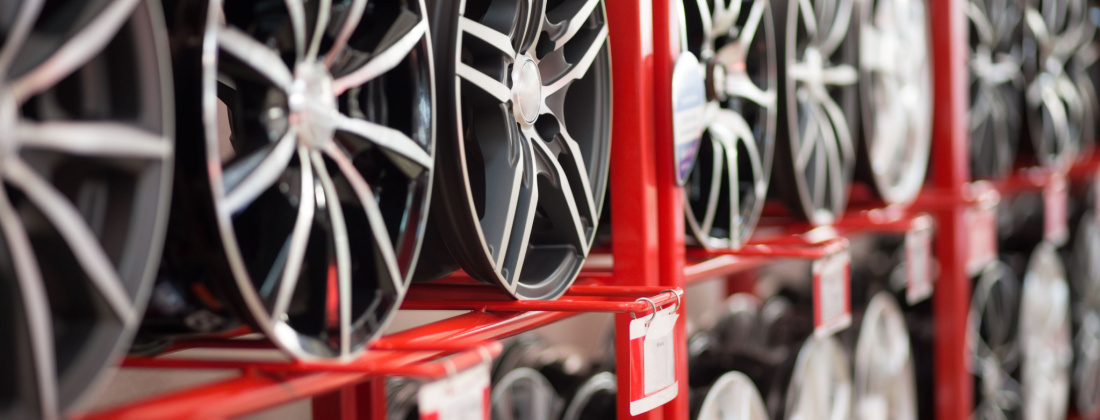
Wheels might be one of the most important features when selecting or buying a car. However, if your vehicle’s set isn’t what you want, fret not. Alloy wheels give your vehicle a brand-new look and feel, and a new set might be just what your vehicle needs. Numerous brands are available in the market, and Ward Tirecraft 3681 has some of the best high-quality wheels and tires in Janet. To learn more about alloy wheels, read on.
As its name suggests, alloy wheels are made of many metals, most often aluminum or magnesium. Because of this, they are sometimes referred to as “mag wheels.” While steel satisfies the definition of an ‘alloy’ (a combination of iron and carbon), the term ‘alloy wheels’ commonly refers to those made of non-ferrous metals.
Alloy wheels are a popular choice because they come in various styles and can add to the look of your vehicle. During the painting and powder coating processes, the production technology enables innovative and personalized designs, allowing you to choose a style that suits your car.
Additionally, they are relatively light, which helps reduce fuel consumption while improving vehicle performance through enhanced braking, acceleration, steering, and handling. Alloy wheels are particularly appealing due to their durability; they resist corrosion and dust.
Alloy Wheels come in different shapes and sizes. Some come in Star shape, while others come in zigzag form. A few of them are detailed below:
One follows one or multi-step procedures of heating and beating various magnesium alloys in this method or type. As a result, it has better toughness and ductility than Aluminum wheels.
A crucible is used in die casting (ceramic or mould that can stand high heat). It contains molten magnesium but is enclosed with compressed air or a cover gas mixture.
When a steel die is put on top of the crucible, the compressed air or cover gas mix causes the molten magnesium to climb to the filler tube and then to the die. Along with that, this process produces a more ductile alloy than magnesium or aluminum alloys.
The molten magnesium is poured onto a filler tube known as a shot sleeve in this procedure. The piston is then triggered, which forces metal into the die mounted on top of a massive machine. The die is opened when the magnesium has hardened to generate a new magnesium wheel.
High-pressure die-cast wheels have lower elasticity and strength. Nonetheless, they are more corrosion-resistant and less expensive to create.
This method refers to pouring molten metal from the crucible into a mould without using pressurized gasses, vacuums or centrifugal force as for aluminum. It can be injected directly into the mould. After that, machining gives the desired finish to the Alloy Wheels.
The method was started way back in the 1920s and is popular because the tooling costs are the most affordable. Additionally, it provides desired elasticity and flexibility in design and development.
This procedure makes forged wheels that are one-piece, two-piece, or three-piece. Generally, cast wheels are bulkier than forged wheels because the mould was designed to preserve strength. Still, forged wheels are stronger, lighter, and more costly than cast wheels due to the complicated production process.
Although aluminum wheels are commonly referred to as “alloy wheels,” they are constructed of nickel and aluminum. Today, most aluminum wheels are made from moulded molten metal. As a result, they are known as cast aluminum alloys. On the other hand, forged aluminum alloys are stronger but lighter than alloy wheels.
Installing alloys wheels or rims on the car can be a great deal as it effectively enhances vehicle performance. They are easier to control than steel wheels as they are lighter in weight and reduce the overall weight of the vehicle. One can maneuver the car more stably and efficiently. Reduced weight entails:
In other words, alloy wheels cars are lighter than conventional equivalents, making it easier and quicker to stop and start the vehicle. Additionally, braking and changing speeds on the road use less fuel.
Driving with heated tires is dangerous. Thus, alloy wheels ensure that heat is conducted and adequately dissipated on vital vehicle elements such as brakes. This function keeps the automobile safe by preventing overheating and excessive braking.
Because they are more ductile, alloy wheels are increasingly fashionable. So, anticipate additional options for spoke shapes and sizes, from 14-inch wheels to 28-inch wheels. Custom alloy wheels are permitted by automakers so that you may give your car more control.
On the other hand, steel wheels often have 16-inch rims and cannot be mounted on automobiles built to accommodate alloy wheels. Due to the mould preparation, die-cast alloy wheels can support various aesthetic treatments. It cannot produce a variety of beautiful spokes, unlike steel wheels made through welding.
Want to upgrade your standard vehicle rims with updated alloy wheels in Janet? No worries, you have come to the right spot—Ward Tirecraft 3681, is a well-reputed shop that takes complete care of your cars and heavy-duty vehicles while providing excellent customer service. We have a vast collection of Alloy wheels or rims in different shapes and sizes for you to choose from. Contact us to get started!